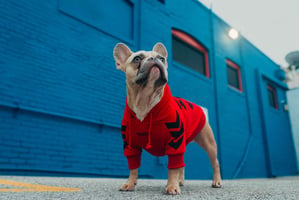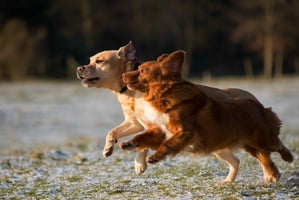Training your dog is a rewarding experience that can strengthen the bond between you and your pup....
How to Solve Your Biting Puppy Problems
Do you have a biting puppy? Are you looking for ways to stop the problem? This article will provide you with the best advice and tips on how to solve your biting puppy problems. We will discuss how to use positive reinforcement, how to distract your pup, and other methods to help you and your pup get through this difficult period.
What is Positive Reinforcement?
Positive reinforcement is a type of training that rewards good behaviour and discourages bad behaviour. It is important to use positive reinforcement when training your pup not to bite. This can be done by giving your pup treats when they perform the desired behaviour, such as not biting, and ignoring or redirecting your pup's attention when they do something undesirable, such as biting.
The key is to be consistent with your training and to reward your pup for good behaviour. This will help your pup learn what is expected of them and will help them to understand that bad behaviour will not be tolerated.
Distraction Techniques
Distraction techniques can be used to help redirect your pup's attention away from biting. This can be done by using toys, treats, or other objects to distract your pup. You can also use verbal commands such as "no" or "stop" to help redirect your pup's attention.
It is important to remember that distraction techniques should only be used as a last resort. If your pup continues to bite, it is important to use positive reinforcement to encourage good behaviour and discourage bad behaviour.
Exercise and Mental Stimulation
Biting can often be a sign of boredom or frustration. This is why it is important to make sure your pup has enough exercise and mental stimulation. Exercise is important for your pup's physical and mental health. Mental stimulation is important for your pup's mental health and can help to reduce boredom and frustration.
You can provide your pup with exercise and mental stimulation by taking them on regular walks, playing interactive games with them, or providing them with enrichment activities such as food puzzles.
Provide Chew Toys
Providing your pup with chew toys can help to reduce their urge to bite. Chew toys can provide a safe outlet for your pup to explore and satisfy their natural instinct to chew.
It is important to make sure that the chew toys you provide are safe and appropriate for your pup. You should also make sure to supervise your pup when they are playing with their toys to ensure that they do not chew on anything that is not meant for them.
Socialisation
Socialisation is important for your pup's development and can help to reduce their urge to bite. It is important to expose your pup to different people, places, and animals in order to help them learn how to interact with the world around them.
It is important to remember to take things slow and to ensure that your pup is comfortable with the situation before proceeding. You should also make sure to supervise your pup during socialisation to ensure that they do not bite or act aggressively towards others.
Seek Professional Help
If you are having difficulty solving your pup's biting problem, it is important to seek professional help. A qualified dog behaviourist can provide you with advice and guidance on how to address your pup's behaviour and can help you to create a plan of action.
It is important to remember that it is not your fault if your pup is biting. It is important to seek help so that you can address the issue and help your pup to learn appropriate behaviour.
Conclusion
Biting can be a difficult problem to solve, but it is possible. It is important to use positive reinforcement to encourage good behaviour and discourage bad behaviour. It is also important to provide your pup with enough exercise and mental stimulation, provide them with chew toys, and socialise them. If you are having difficulty solving your pup's biting problem, it is important to seek professional help.
By following the advice in this article, you will be able to help your pup to learn appropriate behaviour and to stop biting. With patience and consistency, you and your pup will be able to get through this difficult period.



